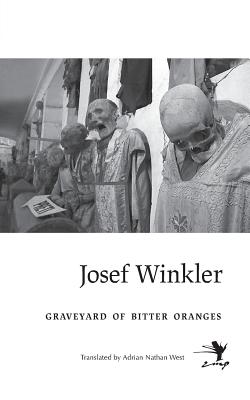Graveyard of Bitter Oranges

Graveyard of Bitter Oranges
In 1979, Josef Winkler appeared on the literary horizon as if from nowhere, collecting numerous honors and the praise of the most prominent critical voices in Germany and Austria. Throughout the 1980s, he chronicled the malevolence, dissipation, and unregenerate Nazism endemic to Austrian village life in an increasingly trenchant and hallucinatory series of novels. At the decade's end, fearing the silence that always lurks over the writer's shoulder, he abandoned the Hell of Austria for Rome: not to flee, but to come closer to the darkness. There, he passes his days and nights among the junkies, rent boys, gypsies, and transsexuals who congregate around Stazione Termini and Piazza dei Cinquecento, as well as in the graveyards and churches, where his blasphemous reveries render the most hallowed rituals obscene. Traveling south to Naples and Palermo, he writes down his nightmares and recollections and all that he sees and reads, engaged, like Rimbaud, in a rational derangement of the senses, but one whose aim is a ruthless condemnation of church and state and the misery they sow in the lives of the downtrodden. Equal parts memoir, dream journal, and scandal sheet, the novel is, in the author's words, a cage drawn around the horror. Writing here is an act of commemoration and redemption, a gathering of the bones of the forgotten dead and those outcast and spit on by society, their consecration in art, and their final repatriation to the book's titular graveyard.
Descrierea produsului
In 1979, Josef Winkler appeared on the literary horizon as if from nowhere, collecting numerous honors and the praise of the most prominent critical voices in Germany and Austria. Throughout the 1980s, he chronicled the malevolence, dissipation, and unregenerate Nazism endemic to Austrian village life in an increasingly trenchant and hallucinatory series of novels. At the decade's end, fearing the silence that always lurks over the writer's shoulder, he abandoned the Hell of Austria for Rome: not to flee, but to come closer to the darkness. There, he passes his days and nights among the junkies, rent boys, gypsies, and transsexuals who congregate around Stazione Termini and Piazza dei Cinquecento, as well as in the graveyards and churches, where his blasphemous reveries render the most hallowed rituals obscene. Traveling south to Naples and Palermo, he writes down his nightmares and recollections and all that he sees and reads, engaged, like Rimbaud, in a rational derangement of the senses, but one whose aim is a ruthless condemnation of church and state and the misery they sow in the lives of the downtrodden. Equal parts memoir, dream journal, and scandal sheet, the novel is, in the author's words, a cage drawn around the horror. Writing here is an act of commemoration and redemption, a gathering of the bones of the forgotten dead and those outcast and spit on by society, their consecration in art, and their final repatriation to the book's titular graveyard.
Detaliile produsului












